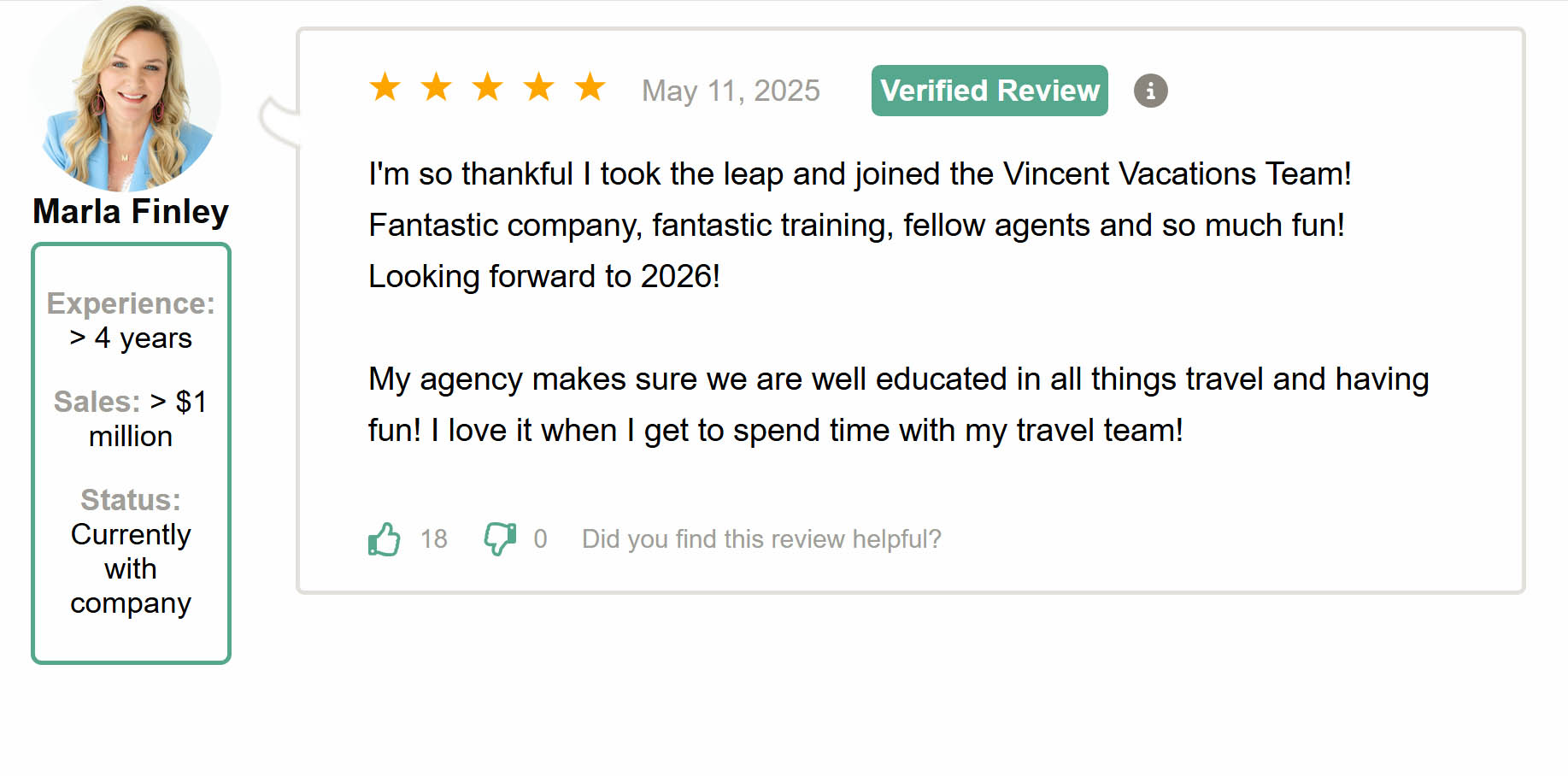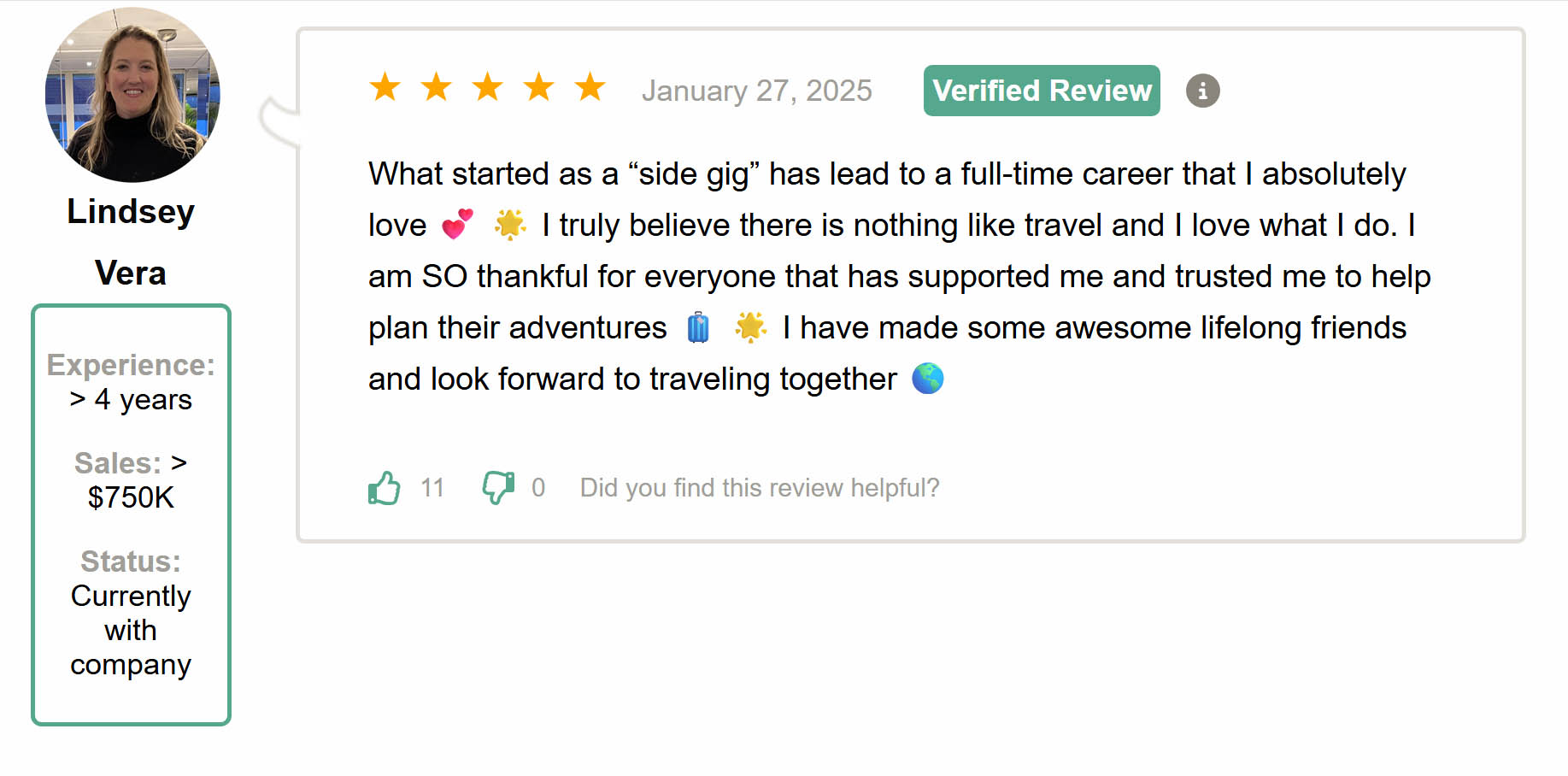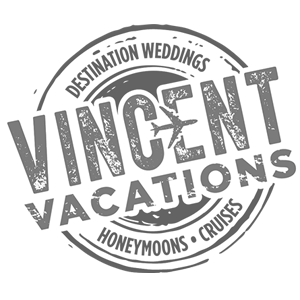How Is the Travel Agent Role Changing in 2025?
To learn more techniques and how to become a travel agent, sign-up to become a travel agent today!
The travel agent profession is undergoing a profound transformation, blending cutting-edge technology with unparalleled human expertise.
As we move through 2025, these professionals are no longer just booking engines – they’ve become curators of hyper-personalized experiences and guardians against travel uncertainties.
Vincent Vacations
Build your own travel business. Launched by industry veterans, Vincent Vacations is working to carve out a niche as a boutique, community-driven option designed by advisors, for advisors.
Learn MoreThe New Toolkit for Travel Professionals
Today’s agents wield an impressive arsenal of digital tools:
Essential 2025 Travel Tech
- - AI-driven itinerary builders
- - Virtual reality destination previews
- - Blockchain-based booking systems
This technological leap allows agents to focus on what humans do best – crafting narratives around travel dreams. The emotional intelligence required to understand a family’s need for multigenerational bonding spaces or a solo traveler’s desire for self-discovery remains irreplaceable.
"We’re not competing with algorithms – we’re teaching them what matters to real travelers."
From Transactional to Transformational
The modern agent’s value proposition has shifted dramatically:
| 2015 Focus | 2025 Priority |
|---|---|
| Price comparisons | Experience curation |
| Basic bookings | Risk mitigation strategies |
| Standard packages | Carbon-neutral itineraries |
This evolution reflects travelers’ growing demand for meaningful journeys that align with personal values and lifestyle aspirations. Agents now serve as cultural interpreters, helping clients navigate complex geopolitical landscapes and sustainability considerations.

Evolving Travel Industry Trends Impacting Travel Agents
Rise of Solo and Small Group Travel
Solo travel bookings have surged by 40% since 2022, driven by remote work flexibility and social media inspiration. Agents now curate safety-focused itineraries featuring:- - Local co-working spaces with reliable WiFi
- - Group tours for solo travelers to connect
- - AI-powered matchmaking for compatible travel buddies
Shifting Destination Preferences and Emerging Markets
| Emerging | Traditional |
|---|---|
| Armenia's wine routes | French Riviera |
| Bhutan's mindful retreats | Bali resorts |
Agents leverage real-time political climate alerts and VR previews to help travelers navigate less-charted destinations safely.
Increased Demand for Sustainable and Experiential Travel
Carbon-Neutral Package Components
- Train-first transportation policies
- Local homestay partnerships
- Voluntourism add-ons
"Modern clients want their passport stamps to tell a story, not just show a photo op" - Sustainable Travel Advocate
Agents now maintain eco-certification databases and partner with indigenous experience providers to craft truly immersive journeys.

Technology Integration Transforming Travel Agent Services
The role of travel agents is undergoing significant changes in 2025, largely due to advancements in technology. These innovations are not only enhancing efficiency but also redefining the services offered by travel professionals. Key among these changes is the integration of artificial intelligence (AI), automation, and advanced information technology systems.Use of AI and Automation for Efficient Booking
Travel agents are leveraging AI and automation to streamline booking processes. This technology allows for faster and more accurate handling of bookings, reducing the need for manual intervention and minimizing errors. For instance, AI-powered chatbots can assist with initial queries, freeing up agents to focus on more complex tasks. Benefits of AI in Booking include:- Real-time availability checks and instant confirmations.
- Automated reminders and notifications for clients.
- Personalized recommendations based on client preferences.
Leveraging Generative AI for Personalized Travel Planning
Generative AI is revolutionizing travel planning by offering personalized itineraries tailored to individual preferences. This technology can analyze a client's past travels, interests, and budget to create bespoke travel plans that include everything from accommodations to activities.
Generative AI enables travel agents to deliver highly customized experiences, setting them apart in a competitive market.
Implementing Advanced IT Systems for Client Management
Travel agencies are also implementing advanced IT systems to manage client data and interactions more effectively. These systems help track client preferences, travel history, and feedback, allowing agents to provide better service and build stronger relationships.| Feature | Description |
|---|---|
| Centralized Client Database | Stores client information in a single, accessible location. |
| Automated Communication Tools | Sends regular updates and offers to clients based on their interests. |
| Feedback Analysis | Analyzes client feedback to improve service quality. |
Vincent Vacations
Build your own travel business. Launched by industry veterans, Vincent Vacations is working to carve out a niche as a boutique, community-driven option designed by advisors, for advisors.
Learn MoreTroubleshooting and Ensuring Data Security
As travel agents become more reliant on technology, ensuring data security is paramount. This includes implementing robust cybersecurity measures to protect client information and troubleshooting any technical issues promptly to maintain service continuity.

Enhanced Customer Experience and Relationship Building
The role of travel advisors is evolving, with a focus on enhancing customer experiences and nurturing stronger relationships. This shift is driven by the increasing demand for personalized and seamless travel experiences. Travel agents are now expected to manage every aspect of the customer's journey, from initial inquiry to post-travel feedback.End-to-End Customer Journey Management
End-to-end customer journey management involves understanding and catering to travelers' needs at every stage. This includes providing personalized recommendations, handling bookings efficiently, and offering support during and after the trip. By leveraging technology and data analytics, travel agents can tailor their services to meet individual preferences and build loyalty.
| Stage | Description |
|---|---|
| Pre-Travel | Personalized travel planning and booking assistance. |
| During Travel | Real-time support and updates on travel conditions. |
| Post-Travel | Feedback collection and follow-up services. |
Personalization Strategies to Elevate Client Satisfaction
Personalization is crucial for elevating client satisfaction. Travel agents can use data and insights to offer customized travel packages that align with clients' interests and preferences. This might involve creating bespoke itineraries, recommending local experiences, or ensuring that accommodations meet specific needs.Building Trust Through Expertise and Communication
Building trust with clients is essential for successful relationship building. Travel agents achieve this by showcasing their expertise through knowledgeable recommendations and maintaining open communication channels. This includes responding promptly to inquiries, providing regular updates, and being transparent about costs and services.Expertise and communication are the cornerstones of building trust in the travel industry. By consistently delivering valuable insights and maintaining clear lines of communication, travel agents can establish lasting relationships with their clients.
- Consistent follow-up to ensure client satisfaction.
- Transparency in pricing and services.
- Empathy and understanding in communications.
Become a Travel Agent: Unleash Your Full Potential
Ready for a career that's as fulfilling as it is rewarding? Becoming a travel agent with Vincent Vacations means building a business around your passion for travel.

Must-Have Skills for Travel Agents to Succeed in 2025
In 2025, the role of travel agents is evolving significantly. To remain competitive, travel agents must possess a diverse set of skills that cater to the ever-changing demands of the travel industry. These skills not only enhance their proficiency but also improve customer satisfaction.Interpersonal and Communication Skills
Effective communication is crucial for building strong relationships with clients, understanding their needs, and providing personalized services. Travel agents must be adept at listening, empathizing, and articulating their ideas clearly. This includes being able to convey complex travel options in an easy-to-understand manner, making them indispensable in creating memorable travel experiences.
In-Depth Destination Knowledge and Cultural Awareness
Travel agents need to have extensive knowledge of various destinations, including cultural insights, local customs, and current events that might impact travel. This helps them create unique itineraries that cater to the interests and preferences of their clients. Cultural awareness also ensures that travel recommendations are respectful and relevant.| Destination | Cultural Awareness Tips |
|---|---|
| Japan | Understand the significance of bowing and gift-giving customs. |
| India | Be aware of dietary restrictions and respect for local traditions. |
Advanced Digital Marketing and Social Media Strategies
Today, digital presence is vital for travel agents. They must be proficient in using social media platforms to engage with potential clients, share travel experiences, and stay updated with industry trends. Advanced digital marketing skills help travel agents promote their services effectively and expand their client base. For example, using Instagram to share captivating travel stories or leveraging Facebook for targeted advertising can significantly boost their online visibility.Travel agents who master social media can turn followers into loyal customers by sharing engaging content that resonates with their audience.
Technical Proficiency with Booking Platforms and Tools
Travel agents should be proficient in using various booking platforms and tools to streamline their operations. This includes understanding how to manage bookings efficiently, troubleshoot common issues, and stay updated with the latest software and technology trends.
The ability to navigate these systems with ease not only saves time but also enhances customer satisfaction by providing quick and reliable service.
Moreover, having strong technical skills allows travel agents to automate routine tasks, giving them more time to focus on offering personalized services.
Common Booking Platforms Used by Travel Agents
Some of the most commonly used platforms include Amadeus, Sabre, and Galileo. Each of these platforms offers unique features and benefits.
Adapting to New Booking Platform Preferences and Distribution Channels
Trends in Online vs. Agent-Assisted Bookings
The travel industry in 2025 is witnessing a dynamic shift in how travelers book their trips. While online self-service platforms continue to grow in popularity due to their convenience and speed, agent-assisted bookings remain essential for complex itineraries and personalized service. Many travelers now prefer a hybrid approach, starting their research online but seeking expert advice before finalizing their plans. Key trends include:- Increased preference for mobile-friendly booking platforms
- Growing demand for customized travel experiences requiring agent expertise
- More travelers using agents for multi-destination or multi-modal trips
Vincent Vacations
Build your own travel business. Launched by industry veterans, Vincent Vacations is working to carve out a niche as a boutique, community-driven option designed by advisors, for advisors.
Learn MoreUtilizing Data-Driven Insights for Platform Selection
In 2025, travel agents leverage data-driven insights to decide which booking platforms best suit their clients’ needs. By analyzing customer preferences, booking patterns, and platform performance metrics, agents can tailor their recommendations and select distribution channels that maximize value and convenience.
Examples of data use in platform selection
- Tracking conversion rates across different online travel agencies (OTAs)
- Analyzing customer feedback to identify the most reliable platforms
- Monitoring dynamic pricing trends to offer the best deals
Collaborations with OTAs and Travel Technology Providers
Collaboration is at the heart of the evolving travel agent role. Agents are increasingly partnering with Online Travel Agencies (OTAs) and travel technology providers to expand their reach and improve service offerings.
These partnerships bring several benefits:
| Benefit | Description |
|---|---|
| Access to Expanded Inventory | Agents can offer a wider range of flights, hotels, and experiences by tapping into OTA databases. |
| Real-Time Pricing & Availability | Integration with technology platforms enables agents to provide up-to-date information instantly. |
| Enhanced Customer Experience | Technology tools allow personalized recommendations and seamless booking processes. |
Looking ahead: these collaborations are set to deepen, with agents playing a pivotal role in bridging technology and personalized service to meet traveler expectations in 2025 and beyond.

Operational Efficiency and Workflow Optimization in 2025
The travel agent role is changing rapidly in 2025, with a strong focus on enhancing operational efficiency and optimizing workflows. This transformation is crucial for travel agencies to remain competitive in a highly dynamic market. Key strategies include streamlining processes with automation tools, implementing effective time management strategies during high-demand periods, and balancing personalized service with scalability.Streamlining Processes with Automation Tools
Automation tools are revolutionizing the way travel agents work by automating repetitive tasks, such as booking confirmations and customer notifications. This not only reduces manual errors but also frees up agents to focus on higher-value tasks like providing personalized travel recommendations and resolving complex issues. For instance, AI-powered chatbots can handle initial customer inquiries, allowing human agents to concentrate on more nuanced interactions.
| Automation Feature | Benefits |
|---|---|
| AI-powered Booking Systems | Efficient processing of bookings, reducing wait times for clients. |
| Automated Customer Notifications | Timely updates via email or SMS, enhancing customer satisfaction. |
Time Management Strategies for High-Demand Periods
Demand for travel services often peaks during holidays and summer months. Effective time management is essential during these periods to ensure that all customer requests are met promptly. Strategies include prioritizing tasks, leveraging technology to streamline workflows, and possibly hiring temporary staff to support permanent employees.
Balancing Personalized Service with Scalability
As travel agencies grow, they face the challenge of balancing personalized service with scalability. This involves using technology to enhance customer interactions while ensuring that each client receives tailored advice and support. Personalized recommendations, for example, can be generated using data analytics tools, allowing agents to offer bespoke travel experiences at scale.Personalization is key in today's competitive travel market. By leveraging data analytics and AI, travel agents can provide unique travel recommendations that meet the specific needs of each client.
Embracing these strategies will enable travel agencies to thrive in 2025 by enhancing operational efficiency, managing time effectively during peak periods, and scaling personalized services to meet growing demands.
For Both Aspiring and Experienced Travel Advisors
Build a travel business doing what you love - on your own terms. Start booking trips the day you join, with a best-in-class education curriculum developed by industry experts.

Navigating Market Challenges and Competitive Pressures
Travel agents face a myriad of challenges in the competitive landscape of 2025. With the rise of DIY travel apps and heightened price sensitivity, the role of the travel agent is changing significantly. Let's explore how travel agents are adapting to these changes and maintaining their relevance in the industry.Responding to Increased Competition from DIY Travel Apps
The proliferation of DIY travel apps has forced travel agents to rethink their strategies. To stay competitive, agents must focus on providing personalized experiences and expert knowledge that apps cannot replicate. Here are some key strategies:- Personalized Itineraries: Tailor trips based on individual client preferences and needs.
- Exclusive Services: Offer services like insider tips, special access to events, or unique experiences that apps can't match.
- Expert Advice: Provide in-depth knowledge about destinations and travel options that is often missing in app-based booking systems.
Addressing Price Sensitivity and Value Expectations
Price sensitivity has become a critical factor in the travel industry. Clients are often looking for the best value without sacrificing quality. Here's how travel agents can address this: By focusing on transparency and clear communication about costs and benefits, travel agents can build trust with their clients. This includes:- Transparent Pricing: Clearly explain all costs involved in a trip, avoiding hidden fees.
- Value-Added Services: Highlight additional services or perks that enhance the travel experience, justifying the price.
Travel agents must emphasize the value proposition that sets them apart from automated booking systems—personalized service, expert advice, and exclusive experiences.
Maintaining Relevance Through Continuous Learning
Continuous learning is crucial for travel agents to stay relevant in a rapidly changing industry. As new technologies and trends emerge, agents need to stay updated: This includes staying informed about:- Industry Trends: Keeping up with the latest travel trends, technologies, and consumer behaviors.
- Certifications and Training: Pursuing certifications and ongoing education to enhance skills and knowledge.
As the travel industry continues to change, agents must be adaptable and responsive to customer needs. This involves leveraging technology to streamline processes while maintaining a human touch that is essential for building lasting relationships with clients.

Leveraging Data Analytics and Customer Insights
Data analytics has become a cornerstone in transforming the role of travel agents in 2025. By harnessing powerful tools and insights, agents can offer more personalized and efficient services to their clients. Here's how data analytics is reshaping the industry:Tracking Travel Behavior and Preferences
Travel agents are increasingly using data to track and analyze customer travel behavior and preferences. This involves monitoring trends in destinations, modes of transportation, and types of accommodations. By understanding these patterns, agents can tailor their recommendations to better match customer needs.| Data Point | Description |
|---|---|
| Destination Trends | Popular places to visit based on recent bookings. |
| Transportation Preferences | Most frequently used modes of travel, such as flights or trains. |
| Accommodation Choices | Types of lodging preferred by travelers, like hotels or vacation rentals. |
Personalizing Offers Based on Predictive Analytics
Predictive analytics allows travel agents to create personalized offers for clients based on their past travel history and current trends. By analyzing this data, agents can anticipate customer needs and provide targeted travel recommendations.Personalization is key in the travel industry. By using data to tailor offers, agents can increase customer satisfaction and loyalty.
Measuring Customer Satisfaction and Loyalty
Customer satisfaction and loyalty are crucial metrics for travel agents. By measuring these through surveys, feedback forms, and customer retention rates, agents can refine their services to meet changing customer expectations. Some common methods for measuring satisfaction include:- Surveys: Collecting feedback directly from customers post-travel.
- Feedback Forms: Providing easy-to-use forms for customers to share their experiences.
- Retention Rates: Analyzing how often customers return to book through the same agent.
By focusing on these metrics, travel agents can ensure they are delivering high-quality, customer-centric services that drive loyalty and retention.
Why Customer Feedback Matters
Customer feedback is invaluable for travel agents as it helps identify areas for improvement and highlights successful strategies. It also allows agents to adjust their offerings and communication style to better align with customer needs.
Sustainability and Ethical Considerations in Travel Planning
As the travel industry changes, sustainability and ethical considerations are becoming increasingly important. Travel agents are no longer just booking flights and hotels; they are now expected to guide clients towards more responsible and eco-friendly options. This shift involves several key areas:Promoting Eco-Friendly Travel Options
Travel agents are now tasked with promoting eco-friendly travel options. This includes suggesting destinations that emphasize environmental conservation, such as national parks or eco-lodges. For example, the Galapagos Islands are a popular destination for nature lovers who want to experience biodiversity while minimizing their environmental footprint.| Destination | Description |
|---|---|
| Galapagos Islands | A UNESCO World Heritage Site known for its unique wildlife and conservation efforts. |
| New Zealand | Famous for its pristine natural landscapes and commitment to sustainable tourism. |
Vincent Vacations
Build your own travel business. Launched by industry veterans, Vincent Vacations is working to carve out a niche as a boutique, community-driven option designed by advisors, for advisors.
Learn MoreEducating Clients on Responsible Tourism Practices
Educating clients about responsible tourism practices is crucial for the ethical development of the travel industry. This includes explaining the importance of respecting local cultures, supporting local economies, and avoiding activities that harm the environment. Travel agents can share guidelines and best practices for minimizing impact during travel, such as reducing plastic use and respecting wildlife habitats.Responsible tourism is about ensuring that tourism contributes positively to both local people and places. This means tourism should respect local environments and cultures, support local economies, and provide fair and honest trading practices.
Integrating Sustainability Certifications into Offerings
Integrating sustainability certifications into travel offerings is another way travel agents can support ethical tourism. Certifications like EarthCheck and Ecotourism Australia help ensure that tour operators meet rigorous environmental standards. This not only appeals to environmentally conscious travelers but also helps to promote sustainable practices throughout the industry.What is EarthCheck?
EarthCheck is a certification program that evaluates the environmental performance of travel and tourism operators. It assesses factors such as energy efficiency, water conservation, and waste management.By incorporating these sustainable practices, travel agents can provide valuable guidance to their clients while contributing to a more responsible travel industry.
From Passion to Profit
Vincent Vacations provides unparalleled benefits to both new and experienced travel agents. We empower you to deliver exceptional value to your clients and elevate your career.

Future Outlook: Preparing for Continued Evolution Beyond 2025
The travel industry is on the cusp of significant transformation, driven by technological advancements and shifting traveler expectations. As we look beyond 2025, it's crucial for travel agents to adapt and evolve to remain relevant.Emerging Technologies Shaping Travel Agent Roles
Emerging technologies such as Artificial Intelligence (AI), Virtual Reality (VR), and Blockchain are revolutionizing the way travel agents operate. For instance, AI can help personalize travel recommendations, while VR can enhance the travel planning experience by allowing clients to explore destinations virtually. Blockchain, on the other hand, promises to increase security and transparency in booking processes.| Technology | Description |
|---|---|
| Artificial Intelligence (AI) | Personalizes travel recommendations and automates routine tasks |
| Virtual Reality (VR) | Enables virtual exploration of destinations |
| Blockchain | Enhances booking security and transparency |
Evolving Traveler Expectations and How Agents Can Adapt
Travelers increasingly expect personalized and immersive experiences. Travel agents can meet these expectations by leveraging customer data to tailor recommendations and by offering unique, curated travel packages. Additionally, agents should focus on sustainability and eco-friendliness, as these factors become more important to travelers.Sustainability and personalization are key in distinguishing between a generic travel experience and a memorable one.
Strategies for Long-Term Business Growth and Resilience
To ensure long-term success, travel agents should diversify their services, focusing on niche markets like luxury travel or adventure tourism. Building strong relationships with suppliers and maintaining a dynamic online presence are also crucial for business resilience.5 Key Strategies for Business Growth
1. Diversify Services: Focus on specialized travel options. 2. Build Supplier Relationships: Strengthen partnerships for better deals and support. 3. Enhance Online Presence: Use digital marketing to reach a broader audience. 4. Invest in Technology: Utilize AI and other tools to streamline operations. 5. Foster Customer Loyalty: Implement loyalty programs and personalized communication.
The Future Is Now: Embracing the New Travel Agent Reality
As we navigate 2025's evolving travel landscape, agents aren't just surviving - they're reinventing hospitality through personalized service and cutting-edge tools.Key Takeaways for Modern Travel Professionals
Successful agents now combine:- Tech mastery with A.I.-powered itinerary builders
- Human touch through bespoke experience curation
- Global awareness of sustainability requirements
| Must-Have | Nice-to-Have | Obsolete |
|---|---|---|
| Blockchain certification | VR training | Paper tickets |
| Crisis management | AR destination previews | Generic packages |
What Clients Expect in 2025
Travelers now demand:- Carbon-neutral itineraries
- Real-time crisis updates
- Augmented reality previews
The Human Element in a Digital World
While automation handles routine bookings, the true differentiator remains the agent's ability to:- Anticipate unspoken client needs
- Negotiate exclusive access
- Transform disruptions into opportunities
"Our role has evolved from transaction processors to experience architects."As we look ahead, the most successful agents will be those who harmonize technological innovation with irreplaceable human intuition, creating travel experiences that resonate on both practical and emotional levels.- Industry Leader, 2025 Travel Symposium
Learn more about this by signing up for one of our online trainings Learn More
To learn more techniques and how to become a travel agent, sign-up to become a travel agent today!






